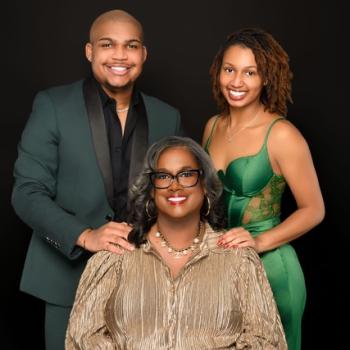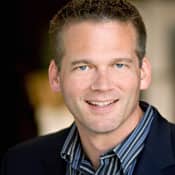Dean Koontz sat down with Leo Brunnick (founder and CEO of Patheos) to talk about his latest novel, The City.
This new release continues Koontz' tradition of writing stories that are exciting and thrilling and scary, while at the same time full of hope and meaning. The City is a story told through the adult eyes of Jonah Kirk as he relates some things that happened to him and his family when he was a boy. Set in a prototypical American city in the 1960s, The City tells a tale of the evil that is present in the world, but also shows that evil can be offset by the far-greater goodness and love that is also there, even where that good is often quiet and unnoticed, and makes the headlines far less often. Avid readers of Koontz' work notice the strong spiritual messages and symbolism that permeate his work, and in The City Koontz gives a view of the world, of divinity, and of the power of love that readers will find very moving. Expect to cry a lot when reading this book ...
In many of your books, and perhaps increasingly so as your work progresses, you show the presence of the Eternal, of Divinity, in nature, animals, relationships, and moments. How do you express that in a story like The City?
The stories I write—aside from the specifics of the story itself—talk about the operation of grace in our lives, which I see around me all the time. And the older I get, the more I see it. I think as you get older, and if you keep yourself alert and aware of what's going on around you, you gain some wisdom, and it helps you see that.
With The City I wanted to tell a story that was about all the different types of love that exist, about the reality of evil, and about the magic that cities that comes from the operation of grace in our lives.
The City started as a much smaller book—basically as an e-single to help promote my previous book (Innocence) – with the connection being that this was in the same "universal city." But as I started telling the story, I became enchanted with the voice of the character, this young piano prodigy Jonah Kirk, and about fifty pages into writing I realized this was going to be a novel. As I wrote, I had one of those experiences that writers can't call forth on demand, and which certainly don't happen to me very often—what psychologists call being in a "flow state" where it seems like you're hardly writing the piece, that you're more of a conduit for it. It made the experience of writing this book exhilarating from beginning to end.
In The City there are such profound demonstrations of the love of a child, a parent, a grandparent, a friend, a neighbor. Was it your intent to try and capture each of these examples of love in its highest form?
My experience in writing is that you start with a basic premise and a character that embodies the essence of what you're going to deal with. I knew this was going to be a story set in the '60s that would feature family love and talk about the best things in our culture, some of which perhaps we've lost in recent years; otherwise I didn't know where the story was going to go.
When I finished the book, I gave it to my wife Gerda, who is always the first to see my work. She said she thought it was the best book I'd ever written. I started getting similar responses from each person who read it; they kept saying how touched they were by the story of the love between the mother and son. I knew going into it that the love between mother and son would be featured in the book, but had no idea how central to the story it would become.
My editor wanted very little changed in the book, but did ask for one specific thing: to include the mother in the climactic showdown. When I tried to read to Gerda the two-page scene that I wrote, I started choking up and couldn't read it because I got too emotional. I told Gerda that I couldn't understand why the book made me so emotional—why I would sit at the keyboard writing while tears would flow?—and she looked at me funny and said, "You don't know? It is the story of your relationship with your mother."
Fact is, my mother was a very strong woman in very difficult circumstances. My father was a ne'er-do-well. And I realized that I'd written, probably from the depths of my heart, about my relationship with her without realizing what I was doing. I don't think I could have written it if I'd tried to do that.
You deal a lot with good and evil in your books. In Innocence, that evil seems overwhelming and supernatural. But in The City, the evil is manifested in flawed human beings. But there are so many more truly good people that you get a sense that evil can and should be defeated. Can you talk a bit about that?





